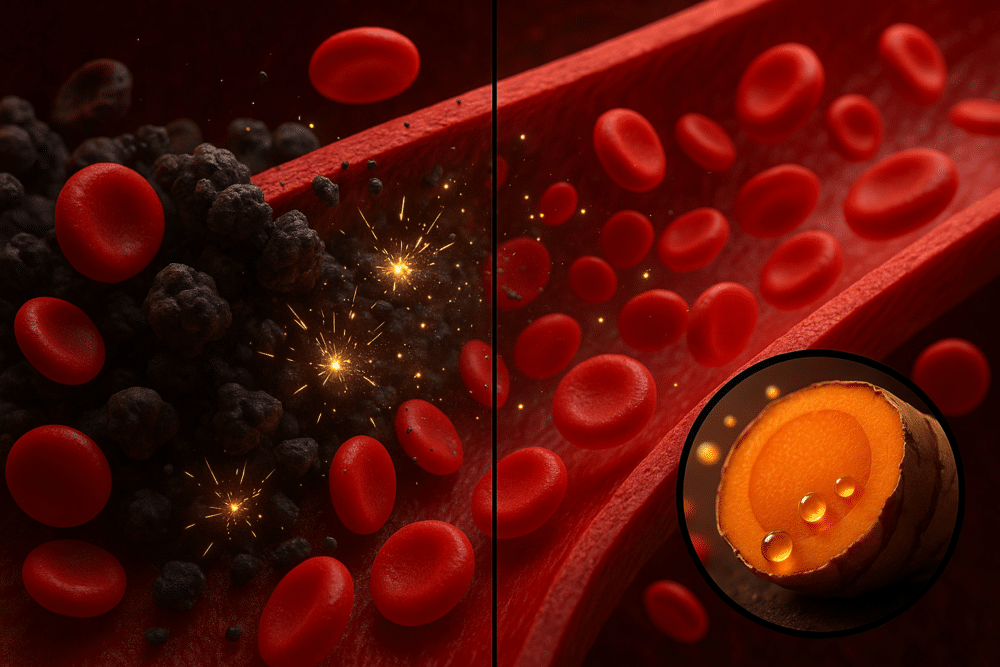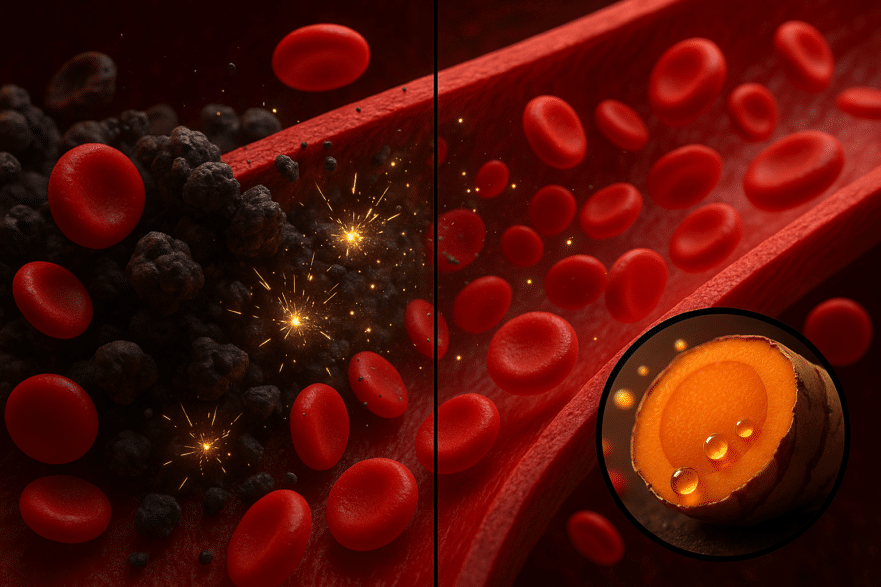
What if you could stop type 2 diabetes before it even starts, using a simple extract from a common spice? It sounds too good to be true, but a landmark study showed a 100% success rate in preventing the disease in at-risk individuals. This groundbreaking result, achieved with curcumin from turmeric, challenges the conventional drug-first approach and opens the door to a world of natural solutions that have been overlooked for far too long.
For the millions of people living with prediabetes, this news could be a game-changer. While standard treatments offer modest results and come with a list of side effects, research points to safer, more effective natural alternatives. We’ll explore what the science says about curcumin, how it stacks up against blockbuster drugs, and why this powerful information isn’t making headlines.
Key Takeaways
- 100% Prevention: In a 9-month clinical trial, a curcumin extract completely prevented the progression from prediabetes to type 2 diabetes in all participants who took it.
- Drugs Fall Short: The leading diabetes drug, metformin, only reduced disease progression by 31% in a major study. Meanwhile, common cholesterol-lowering statin drugs have been found to increase diabetes risk.
- Nature’s Pharmacy: Beyond curcumin, hundreds of natural substances like berberine, vitamin D, and bitter melon are backed by scientific studies for their ability to help manage blood sugar and improve metabolic health.
- Profit Over Patients?: Because natural compounds can’t be patented, there is little financial incentive for major pharmaceutical companies to fund research or promote their benefits, leaving the public largely in the dark.
A Spice That Outperforms Drugs?
In 2012, a randomized, controlled trial published in the American Diabetes Association’s journal, Diabetes Care, delivered a stunning outcome. Researchers in Thailand gave a daily curcumin extract to a group of 240 patients diagnosed with prediabetes. After nine months, not a single person in the curcumin group had developed type 2 diabetes. In contrast, 16.4% of the participants taking a placebo did progress to a full diabetes diagnosis. The curcumin didn’t just halt the disease; it also improved the function of insulin-producing cells and reduced insulin resistance, all with only minor reported side effects.
Imagine if a new pharmaceutical drug demonstrated this level of success. It would be hailed as a miracle and fast-tracked into every doctor’s office. Yet, because curcumin is a natural, unpatentable compound, this incredible study has remained largely under the radar. It highlights a major disconnect in modern medicine: when nature provides a powerful solution, the system often responds with silence.
How Do Standard Treatments Compare?
When you look at the numbers, the performance of conventional drugs pales in comparison. Metformin, the most prescribed medication for high-risk prediabetic patients, was shown to reduce the progression to diabetes by only 31% over three years. While lifestyle changes like diet and exercise are more effective (around 58% risk reduction), they still don’t approach the 100% success rate seen with curcumin.
Even more concerning, some widely used medications may actually be contributing to the diabetes epidemic. Statin drugs, taken by tens of millions to lower cholesterol, have been linked to a significantly higher risk of developing type 2 diabetes. One analysis found that statin use in postmenopausal women was associated with a staggering 48% increased risk. This has led the FDA to require warnings on statin labels about elevated blood sugar. It’s a bitter irony: a drug prescribed to protect your health could be triggering another serious chronic disease.
Nature’s Untapped Pharmacy for Diabetes
Curcumin isn’t an anomaly. It’s just one of hundreds of natural substances with scientifically-backed, anti-diabetic properties. Here are just a few of the standouts:
- Berberine: This plant alkaloid has been shown in clinical trials to be as effective as metformin at lowering blood sugar and HbA1c levels, often with fewer side effects.
- Vitamin D: The “sunshine vitamin” is crucial for metabolic health. Studies show that correcting a vitamin D deficiency can improve blood sugar control and reduce inflammation, a key driver of insulin resistance.
- Probiotics: Your gut health is directly linked to your metabolic health. Supplementing with beneficial bacteria has been found to improve insulin resistance and lower markers of inflammation in people with diabetes.
- Bitter Melon: This fruit, used in traditional Asian medicine, contains compounds that mimic insulin, helping your cells take up glucose from the blood. It has even proven superior to some diabetes drugs in clinical comparisons.
- Magnesium: This essential mineral is vital for proper insulin function, yet many people are deficient. Supplementing with magnesium has been shown to improve insulin sensitivity and lower fasting glucose levels.
Why Haven’t You Heard About This?
If you’re feeling a mix of hope and frustration, you’re not alone. The evidence is clear: we have an arsenal of safe, effective, and accessible tools to fight diabetes. So why isn’t this front-page news? The reasons are primarily economic and regulatory. A natural substance like turmeric can’t be patented, which means there are no exclusive profits to be made. No pharmaceutical company will invest millions in clinical trials and marketing for a remedy they can’t own.
Furthermore, government regulations often prevent supplement makers from telling you about this research. In the U.S., it’s illegal for a company to claim that a natural product can prevent or treat a disease, even if scientific studies support it. This creates a system where information about profitable drugs is widely advertised, while life-changing data on natural remedies remains buried in scientific journals.
Conclusion
The story of curcumin’s 100% success in preventing diabetes is a powerful wake-up call. It proves that type 2 diabetes, a disease largely driven by diet and lifestyle, is highly responsive to natural interventions. We are standing at a crossroads between a future of ever-more-expensive drug dependency and a more holistic approach that harnesses the wisdom of nature. The choice should be clear. It’s time to demand that this research is brought out of the shadows and into mainstream medical practice, empowering you and millions of others to take control of your health.
Scientific References
- Chuengsamarn, S., S. Rattanamongkolgul, R. Luechapudiporn, C. Phisalaphong, and S. Jirawatnotai. “Curcumin Extract for Prevention of Type 2 Diabetes.” Diabetes Care 35, no. 11 (2012): 2121-27. https://pubmed.ncbi.nlm.nih.gov/22773702/
- Diabetes Prevention Program Research Group. “Long-Term Effects of Metformin on Diabetes Prevention.” Diabetes Care 44, no. 12 (2021): 2775-81. https://pubmed.ncbi.nlm.nih.gov/34281467/
- GreenMedInfo. “Statins Raise Diabetes Risk by 48% for Postmenopausal Women.” GreenMedInfo Blog. https://greenmedinfo.com/blog/statins-raise-diabetes-risk-48-postmenopausal-women
- Lan, J., Y. Zhao, F. Dong, Z. Yan, W. Zheng, J. Fan, and G. Sun. “Meta-Analysis of the Effect and Safety of Berberine in the Treatment of Type 2 Diabetes Mellitus, Hyperlipemia and Hypertension.” Journal of Ethnopharmacology 161 (2015): 69-81. https://pubmed.ncbi.nlm.nih.gov/25498346/
- Zhang, Y., X. Li, D. Zou, W. Liu, J. Yang, N. Zhu, L. Huo, M. Wang, J. Hong, P. Wu, G. Ren, and G. Ning. “Treatment of Type 2 Diabetes and Dyslipidemia with the Natural Plant Alkaloid Berberine.” Journal of Clinical Endocrinology & Metabolism 93, no. 7 (2008): 2559-65. https://pubmed.ncbi.nlm.nih.gov/18397984/

